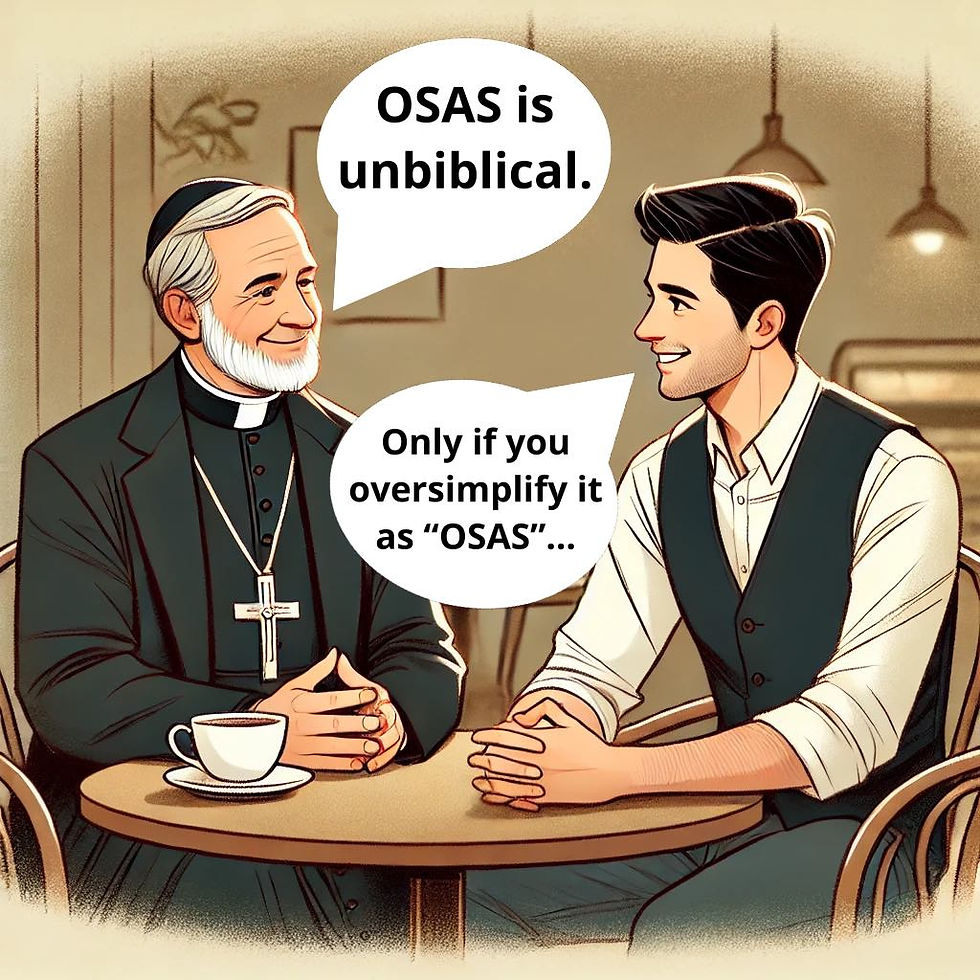Limited Atonement vs. 1 John 2:2
- Bible Brian

- Oct 29, 2023
- 3 min read

By far the least popular doctrine of Calvinism, and with good reason, is Limited Atonement. Did Christ die for the sins of the whole world, or just for the sins of the elect? Anyone who has ever read the Bible should know the answer. What critic of Calvinism cannot cite John 3:16 by heart? What Calvinist hasn't expressed his view, only to receive this verse as an obvious response? God so loved the world that He gave His only Son.
But of course, there are ways around this. The full verse says "For God so loved the world that He gave His only begotten Son, that whoever believes in Him should not perish but have everlasting life." Thus, in keeping with Limited Atonement, we can invent a whole new meaning for the word "world". Rather than meaning all individuals present in this mortal realm, maybe "world" just means whoever believes. That is, whoever is elected to believe.
This interpretation becomes harder to sustain when you bring in other verses, however. Most notably, in 1 John 2:1-2, we read "My little children, these things I write to you, so that you may not sin. And if anyone sins, we have an Advocate with the Father, Jesus Christ the righteous. And He Himself is the propitiation for our sins, and not for ours only but also for the whole world."
Unlike John 3:16, this seems to be an open and shut case. Christ is the propitiation for our sins, and not for ours only, but also the whole world. But maybe we can still cram in the Calvinist interpretation if we just assume "not for ours only" as "not for John and those who read his epistle". Then maybe we can still claim "world" actually just means the elect. Right?
The first problem with this interpretation is there's simply no justification for it. A casual reader, seeking only to know what the text says, will not come to this interpretation. A diligent Christian, seeking to understand Scripture, will not draw this conclusion. Not even a scholar is going to be compelled, reading this, or any other Scripture, to invent a brand new meaning for the word "world", just because it's the only way to preserve Limited Atonement.
Ultimately, because we have no case to answer, we have no real need of a counter argument. The burden of proof is on the Calvinist to show that there is justification to redefine, or even reinterpret, the word "world" here. It isn't on us to show that a more normal use of the word is suitable. But we can!
See, the word "world" is used a whopping 17 times in John's first epistle, all of the others following verse 2:2. Without any clarification that he is using anomalous language, taking for granted that his audience will understand. Of the other 16, only one of them could even be twisted to support the Calvinist interpretation. 1 John 4:14 tells us "And we have seen and testify that the Father has sent the Son as Savior of the world." Ah, great, Savior of the elect. Right?
But that interpretation gets harder when it comes to verse 2:15: "Do not love the world or the things in the world. If anyone loves the world, the love of the Father is not in him." So, if we love our fellow Christians, or "the things in them" (which, presumably, would have to include the Holy Spirit), the love of the Father is not in us? I suppose, if we're going to take that interpretation, verse 3:13 makes sense: "Do not marvel, my brethren, if the world hates you."
Perhaps the most devastating example would be verse 5:19: "We know that we are of God, and the whole world lies under the sway of the wicked one." Now, I'm not going to pretend we, as Christians, are completely immune from the adversary's fiery darts. He's a lion, seeking whom he may devour, and yes, if possible, he will deceive even the elect. But I think it's much more logical to suggest that the unbelieving world, saturated in depravity, is under the sway of the wicked one, than that God will not provide His elect with some defence against this monster.
Clearly, therefore, the word "world" in 1 John 2:2 cannot be reasonably reinterpreted to only include the elect, even if we only go by verses found within the same epistle. If we expand our reading beyond this epistle, it gets even less sustainable. Only those with a particular agenda will take this particular interpretation, and I submit that such a methodology is called eisegesis, a terrible, and frankly very sinful way of reading Scripture. Thus, while no verse should ever be taken alone, 1 John 2:2 alone is sufficient to thoroughly refute the Calvinist doctrine of Limited Atonement.






Comments